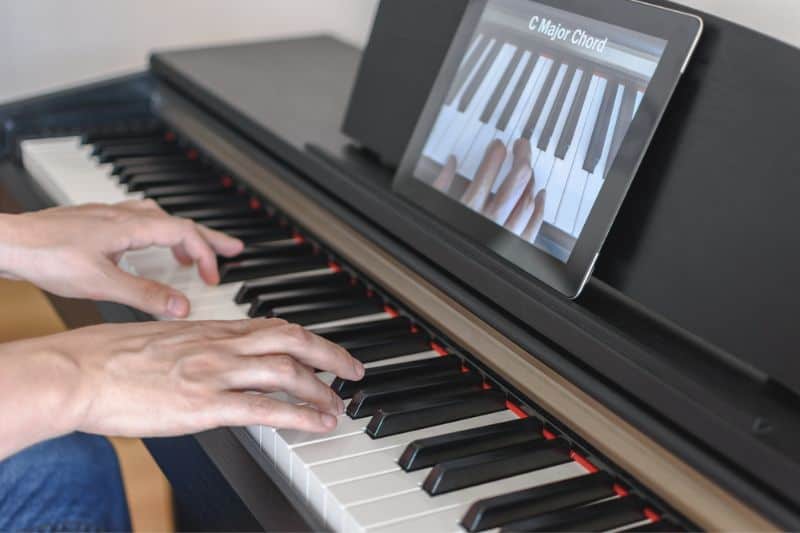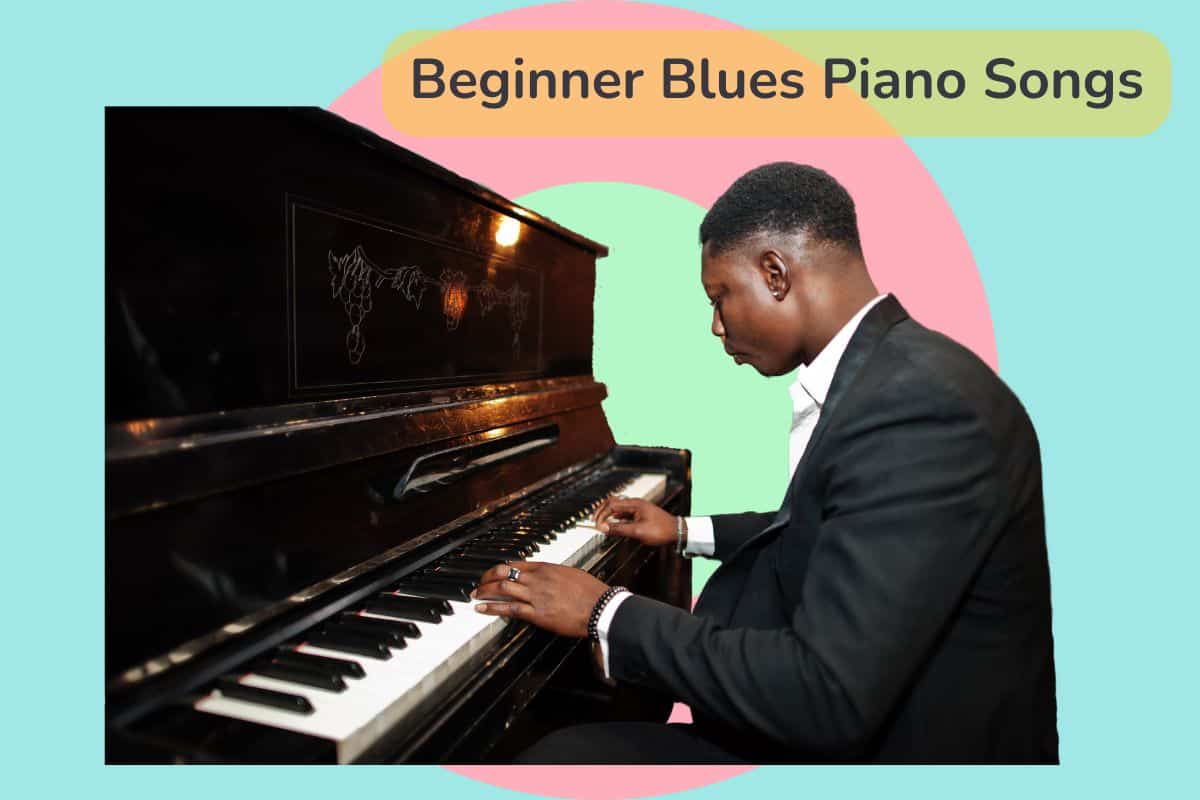Are you tired of practicing piano for hours on end with little improvement? Do you feel like you’re not making progress despite your efforts? Well, you’re not alone; all it could take is a simple fix to get you on the right track.
You see, the problem may not be how much time you spend practicing but how you’re practicing.
Deliberate practice is a science-based technique that can help you make the most of your practice time and improve your piano skills. It involves:
- Focusing on specific skills or techniques.
- Breaking them down into smaller parts.
- Practicing each part until it becomes automatic.
You actively engage in the practice session, constantly monitoring your progress and adjusting as needed.

In this article, we’ll explore the concept of deliberate practice and how it can help you improve your piano skills. We’ll also provide tips and techniques for incorporating it into your daily practice routine.
By the end of this article, you’ll better understand how to practice effectively and efficiently, and you’ll be on your way to becoming a better pianist.
What is Deliberate Practice?
Deliberate practice was initially defined by psychologist Anders Ericsson and his team. They proposed it as an effective practice routine that is focused, purposeful, and systematic. It is an approach to learning that emphasizes quality over quantity, aiming to improve performance and achieve expertise in a particular skill or domain.
To engage in deliberate practice, you must clearly understand your goals and the steps required to achieve them. You must also be willing to push beyond your comfort zone to challenge yourself to do difficult and uncomfortable things.
Deliberate practice involves breaking down complex tasks into smaller, manageable components and working on each individually until you have mastered it. This approach allows you to build a strong foundation of skills and knowledge to apply to more complex tasks.
One of the critical features of this way to practice is feedback. You need to receive regular feedback on your performance from yourself and others to identify areas that need improvement and track your progress over time. This feedback should be specific, actionable, and focused on the areas that are most critical to your success.
Another important aspect of deliberate practice is repetition. You must practice a particular skill or task repeatedly, focusing on improving each time. This repetition allows you to build muscle memory and develop automaticity to perform tasks more easily and efficiently.
Finally, deliberate practice requires a high level of motivation and commitment. You must be willing to put in the time and effort needed to achieve your goals, even when difficult or frustrating. This means setting realistic goals, developing a plan for achieving those goals and staying focused on your progress over time.
Why Deliberate Piano Practice is Important
When it comes to improving your piano skills, practicing regularly is essential, but practicing deliberately is even more crucial. Being deliberate involves focusing on specific aspects of your playing and working to improve them systematically. This type of practice is essential for becoming a proficient and confident pianist.
One of the reasons why this type of focus is so important is that it helps you identify and correct your weaknesses. By breaking down your playing into smaller components, you can identify areas where you struggle and work to improve them. This can be especially helpful for addressing technical issues, such as finger placement or rhythm.
Another benefit is that it can help you develop good habits. When you practice deliberately, you focus on playing correctly and efficiently. Over time, this can help you build muscle memory and improve your overall technique.
Also, deliberate practice can help you stay motivated and engaged with piano playing. By setting specific goals and working towards them, you can see measurable progress and feel a sense of accomplishment. This can be especially important if you feel stuck or frustrated with your playing.
So, how can you incorporate deliberate practice into your piano routine? One approach is to break down your playing into specific components, such as scales or chord progressions, and work on them individually. You can also use tools like metronomes or recording devices to help you track your progress and identify areas for improvement.
Remember, deliberate practice requires focus and effort, but the rewards are well worth it. By committing to this type of practice, you can improve your piano skills and become a more confident and accomplished player.

How to Practice Deliberately
Setting Goals
You need to set clear and specific goals for yourself. Ask yourself, “What do I want to achieve through your practice session?” Is there a particular piece you want to master or a specific technique you want to improve?
Write down your goals and make them measurable. For example, instead of saying, “I want to play this piece better,” set a goal like “I want to play this piece at 100 bpm without mistakes.”
Breaking Down Pieces
Once you have your goals in mind, break down the piece or technique into smaller sections. Identify the difficult parts and focus on them first. Practice each section slowly and deliberately until you can play it perfectly. Then gradually increase the tempo until you can play the entire piece or technique flawlessly.
Repetition
Repetition is vital to deliberate practice. Repeat each section of the piece or technique until it becomes second nature to you. Play it over and over again, focusing on the details and ensuring you’re playing it correctly. Keep track of your progress and celebrate small victories along the way.
Slow Practice
Playing slowly is an important part of deliberate practice. You can focus on the details when you play slowly and ensure you’re playing each note correctly. The slow approach also helps you build muscle memory and develop good habits. Once you can slowly play a section perfectly, gradually increase the speed until you can play it at the desired tempo.
Remember, as with everything on the piano learning curve, deliberate practice takes time and effort. Keep going even if you don’t see results right away. Keep practicing effectively, set achievable goals, and celebrate your progress along the way. With time and dedication, you’ll improve your performance and become a better pianist.
Common Mistakes to Avoid
Mindless Repetition
One of the most common mistakes pianists make is mindless repetition. It’s easy to fall into the trap of repeatedly playing the same piece without thinking about what you’re doing. This can be counterproductive and hinder your progress.
Instead, focus on practicing with intention. This means paying attention to every note you play and being mindful of your technique and musical expression.
When you’re practicing, break the piece down into smaller sections and focus on perfecting each section before moving on. Use a metronome to help you maintain a steady tempo and gradually increase the speed as you become more comfortable with the piece. By practicing with intention, you’ll be able to make more progress in less time.
Ignoring Technique
Another common mistake is not paying attention to technique. It’s easy to get caught up in the notes and forget about its importance. However, technique is crucial for playing with ease and preventing injuries. Ensure you’re sitting with good posture and using the proper hand position. When playing, use your fingers, wrists, and arms to create a fluid and natural motion.
When practicing a new piece, start slowly and focus on playing with good technique. As you become more comfortable with the piece, gradually increase the speed while still maintaining proper form.
If you need more clarification about your technique, consider taking lessons from a qualified piano teacher who can give you expert feedback and help you develop good habits.
Not Listening to Yourself
Finally, one of the biggest mistakes pianists make is not listening to themselves. It’s important to be aware of the sound you’re producing and to make adjustments as needed. This means paying attention to dynamics, articulation, and phrasing.
When practicing, record yourself playing and listen back to the recording. This will help you identify areas that need improvement and make adjustments to your playing. You can also try playing with other musicians or in front of an audience to get feedback on your playing.
You can make significant progress in your piano playing by avoiding these common mistakes and practicing with intention, good technique, and focusing on musical expression.
Benefits of Deliberate Piano Practice
Improved Technique
When you engage in deliberate piano practice, you can identify specific areas where you need improvement and work on them systematically. This focused approach allows you to develop better techniques, making playing the piano easier and more enjoyable.
For example, suppose you struggle with playing fast runs or challenging chord progressions. In that case, breaking these passages into smaller, manageable parts will be more effective. You can benefit by practicing each piece separately and then gradually combining them.
Increased Musicality
Deliberate practice also helps you better understand the music you are playing. By analyzing the structure and phrasing of a piece, you can better convey its musical meaning and emotion to your audience.
For example, suppose you are playing a slow and melancholy piece. In that case, focusing on each note’s dynamics and timing can create a more expressive and moving performance.
Better Memory Retention
When you engage in deliberate piano practice, you are improving your technique and musicality and enhancing your memory retention. By practicing a piece repeatedly, you are solidifying the neural pathways in your brain that allow you to recall it more easily.
For example, suppose you need help memorizing a particularly challenging piece. In that case, deliberate practice can help you break it down into smaller sections and practice each section until you can play it from memory. Over time, you can play the entire piece from memory with greater ease and accuracy.
Overall, deliberate piano practice is an effective way to improve your piano playing skills. By focusing on specific areas of improvement, developing a deeper understanding of the music, and enhancing your memory retention, you can become a more skilled and expressive piano player. So, next time you sit down at the piano, challenge yourself to start using some of these methods and see how you get on.
Final Thoughts
As you wrap up your journey on deliberate piano practice, remember it’s not just about the quantity of practice that matters but its quality.
By implementing deliberate practice techniques, such as setting specific goals, focusing on weaknesses, and seeking feedback, you can accelerate your progress and achieve your musical aspirations.
Maintaining a growth mindset and believing in your ability to improve is essential. Don’t be discouraged by mistakes or setbacks; use them as opportunities to learn and grow.
As you continue your piano journey, keep in mind the importance of consistency and dedication. Make practicing a regular part of your routine and prioritize it as you would any other important commitment.
Remember, achieving mastery of the keys takes time and effort. Still, with deliberate practice and a positive attitude, you can achieve your goals and enjoy the journey along the way. Happy practicing!



